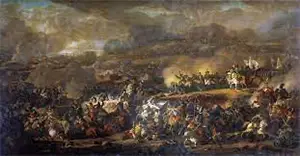Francis II: Holy Roman Emperor
Part 2: New Empire, Same Old Wars The wars continued, with the Empire joining the War of the Third Coalition in 1805. The year before, Francis had declared himself Emperor of Austria, in what he saw as a parallel move to Bonaparte's declaring himself Emperor of the French. This war was very much a war pitting France against the Empire. French troops advanced across the Danube and won a quick victory at Werginten, in October 1805, and then a more significant one at Elchingen. It was at Ulm that the French Army scored a very strategic victory, encircling the Austrian forces and forcing 60,000-strong army to surrender. Within a few weeks, France was ascendant. 
Russia entered the war on the side of the Holy Roman Empire, and the Russian ruler, Alexander I, joined Francis in commanding their forces at the titanic Battle of Austerlitz. Billed as the Battle of the Three Emperors, this was a strongly significant and overwhelmingly strategic and tactical victory for Bonaparte and the French. The result was yet another treaty to end the fighting for the Holy Roman Empire, the Treaty of Pressburg, agreed on December 4. Francis had lost control of his empire by this point. Bonaparte declared it dissolved, replacing it in June 1806 with the Confederation of the Rhine. Francis abdicated on July 22, 1806; thus, he was the last Holy Roman Emperor. He retained his title as Emperor Francis I of Austria. Three years later, Francis attacked France again, while Bonaparte was distracted fighting the Peninsular War. The result was the same, with Francis having to agree to nearly humiliating conditions, joining the Continental System and agreeing to give his daughter Marie-Louise as the new wife of Bonaparte, who had annulled his marriage to his first wife, Josephine, in 1810. 
Three years later, Francis joined other European powers in again opposing France, in the War of the Sixth Coalition. France by this time was considerably weakened by the Peninsular War and by a disastrous invasion of Russia. The titanic Battle of Leipzig was an Allied victory. Bonaparte refused the Frankfurt Proposals, a set of demands that would have amounted to France's returning to its "natural boundaries." Allied troops converged from all sides, entering Paris on March 30, 1814, and forcing Bonaparte's abdication 12 days later. The Treaty of Paris, signed on May 30, 1814, by France and the U.K., officially ended the War of the Sixth Coalition. Following on from that was the Congress of Vienna, which redrew the map of Europe. The ancient seat of Austrian power was the host city for many of the peace discussions, and crafting many of the agreements was the Austrian minister Klemens von Metternich. Francis caused a bit of a problem by reaching a secret agreement with the new French king, Louis XVIII. Francis gave Metternich a free hand in creating what came to be known as the Metternich System, which championed autocracy at the expense of individual liberty; government troops marched to various parts of the empire to stamp out uprisings. Among the imperial pronouncements were the Carlsbad Decrees of 1819, which enforced censorship of speech and the press. The emperor restored power to the Catholic Church. At the same time, however, he championed scientific advances, such as steam power and the railroad. Francis was in Vienna on March 2, 1835, when he died. He was 67. He had married four times. He married Elisabeth of Württenberg in 1788; she died two years later, having given birth to one child who died not long after being born. Francis married Maria Teresa of the Two Sicilies in 1790; they had 12 children, seven of whom survived into adulthood: Maria Ludovika (1791), Ferdinand (1793), Caroline Josepha (1797), Maria Klementina (1798), Maria Karolina (1801), Franz Karl (1802), and Marie Anne (1804). First page > All in the Family > Page 1, 2 |
|
Social Studies for Kids
copyright 2002–2024
David White




